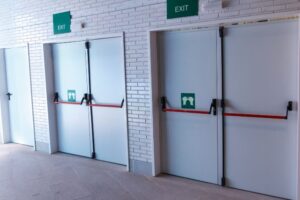Key Points:
- Why server rooms require specialized fire suppression and detection systems.
- What makes server room fire prevention and detection systems unique.
- Why firewatch is continuous when data center fire detection systems are down.
Server rooms in data centers and large corporations pose a unique electrical fire risk. Traditional water sprinklers don’t effectively suppress large electrical fires. So, you may need to install water-based sprinklers on office floors, and gas-based sprinklers in and around large-scale IT equipment and circuit boards. As soon as the detection and suppression system goes down, server room fire watch must be dispatched. Also, when scheduled maintenance or repairs render the system inoperable.
Server rooms must install NFPA 75-compliant detection and suppression systems. Most businesses install an FM-200, Novec 1230, or similar clean agent system that dispenses a colorless and odorless gas to control heat and fire. The room must also be access-controlled, dry, and cool. Maybe even designed as a containment room.
In addition to NFPA Compliance, IT room fire detection systems must have:
- Automatic detection: Detects rising temperature and smoke through a raised subfloor.
- Early fire warning: Activates heat and fire suppression without human intervention.
- Aspirating smoke detectors: Detect small particles of combustion faster than standard detectors.
- Automatic dispatch: Sounds the building fire alarms and dispatches the fire department without human intervention.
Fire Risk is Higher for Most Businesses
With the growing reliance on technology, the average office has a higher electrical fire risk than it did 15 years ago. So, ensure the electrician, audio-visual company, and IoT contractors you work with are certified and reputable. If you have an on-site data center, your fire and loss risk is significantly higher. Even if the room is designed to contain the fire to a single room or controlled area, losing data and equipment is an expense that is difficult to recover from.
If you have on-site servers, you may need to upgrade your fire alarm system.
Read More:
- Fire Watch Duties vs. Security Guard Duties
- 5 Ways a Certified Fire Watcher Saves You Money
- Securing Fire Protection Services During Hot Work
- Why Dispatch Dual-Trained Fire Watch Security Guards
- 4 Times to Dispatch Daily Fire Watch
Treat Server Rooms Like Hot Work
Just like hot work, when data center systems go down, server room fire watch must be dispatched. Even if only for a quick repair. If the fire alarm and sprinkler system goes down on floors without a data center, but the server room system is fully operational, you have a 4 hour window to dispatch fire watch.
Server Room Fire Monitoring Includes:
- Inspecting and suggesting fire safety equipment.
- Repositioning fire extinguishers and blankets.
- Continuous monitoring of the electrical board.
- Patrol of the IT room and nearby rooms.
- Logging of patrols, incidents, and relevant information.
- Communicating with security and building management.
- Emergency response, including evacuation.
Hot Work Can’t Be Completed in The Server Room
Due to the higher fire hazard, welding and hot work can’t be completed in the server room. If the fire alarm and suppression system is operational, but a repair requires welding or other hot work—fire watch must be dispatched before the repair can begin.
If a server requires soldering, remove the circuit board or equipment from the room and conduct compliant monitoring, logs, and patrols.
Server Room Fire Watch Services in Denver
Scout Security understands that system failures can occur any time of the day or night. Dispatch our server room fire watchers 24/7, or during scheduled repairs.
Our services are available in Denver and the Springs. Book now!




